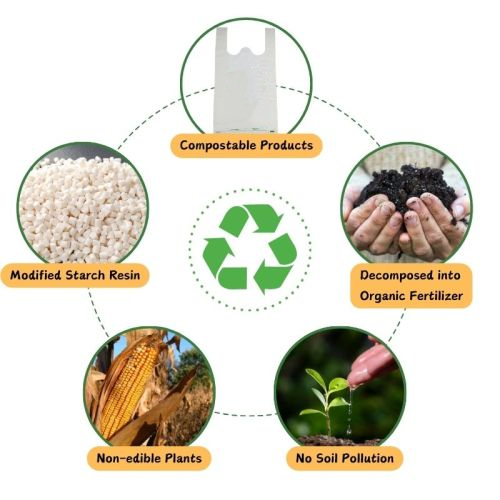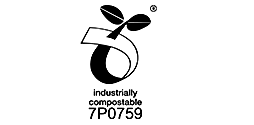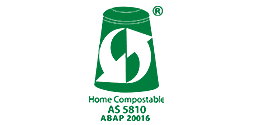What’s compostable bags?
Maybe you have heard of biodegradable plastic bags. That’s right! Roughly speaking, compostable bags are biodegradable bags. So let’s deeply understand what’s the meaning of them. Biodegradable plastic bags refer to plastic bags that are degraded by microorganisms under natural conditions. Compostable bags can be broken down by microorganisms and converted into fertilizer. The decomposition environment and the final product need to be emphasized.

Decomposition environment: Biodegradable plastic bags decompose in a wider range of environments, while compostable bags usually require composting conditions, namely higher temperature, higher humidity, and adequate oxygen.
Decomposition products: Both eventually decompose into harmless substances, but the decomposition products of compostable bags can improve the soil and improve soil fertility.
Certification standards: Compostable bags have professional certification standards, such as EN 13432, ASTM D6400 and so on. Biodegradable bags are often easy to produce “green washing” products: the slogan of environmental protection, the use of consumer feelings.
To be certified compostable, a plastic bag must completely disintegrate into fragments smaller than 2mm within 180 days and eventually convert to CO₂, water, and minerals. And the residue after degradation needs to pass heavy metal detection and plant toxicity test to ensure the quality of compost. Therefore, compostable bag has the compostable certification is an important sign that it is really environmentally sustainable. As a business, it is more important to actively use certified compostable materials, especially in the European Union, California and other places, whose laws require that organic packaging must be used, and illegal products will be prohibited from sale.
If you are purchasing compostable bags, please find out more about our products.
Always talking about composting, composting. So,
How to Compost? Why does the same compostable bag have a different compost sign?


The essence of compost is the process of using the metabolic activities of microorganisms (bacteria, fungi, etc.) to decompose organic waste (such as plant residues, kitchen waste) into humus. The biochemical reaction can be simplified as:
Organic matter + microorganism → CO₂ + water + humus + inorganic salt
If you want to dispose of used compostable plastic bags at home, then you can use the following methods:
- Bury the compostable bag deep in the soil of the yard or garden, and the nutrients will seep into the soil after natural decay. Simple operation, but long composting time.
- If you’re a potting enthusiast, use a compost bin (25:1 of leaves and food waste, enough water to moisten the pile. Turn once a week.) can faster decompose compostable bags. This way even in winter also has a good insulation effect, can be faster fertilizer.
In addition, you can also choose to dispose of them with commercial composting companies. These companies will centrally dispose of all compostable waste. This is called industrial composting.
It’s important to note that there are two types of composting: home and industrial (also known as commercial).
Home Composting: This involves setting up your own composting system at home, where food scraps and yard waste, and sometimes compostable products are broken down. This method requires specific conditions including aeration, moisture, and the correct balance of carbon-rich (brown) and nitrogen-rich (green) materials.
Industrial Composting: This uses large-scale facilities that carefully control environmental conditions like temperature and humidity to speed up the composting process and process items that may not be suited for home composting, like some packaging. These facilities also process larger volumes of compostable materials and usually within a shorter time frame compared to home composting.
In the compostable certification, a distinction is made between home compost and industrial compost. The Home compost certification mark is often used to identify products that are fully biodegradable under home compost conditions. These signs may vary by region or certification body, but will often include the words “Home Compostable” or similar to indicate that the product is suitable for home composting. The Industrial composting certification mark is used to identify products that are fully biodegradable under industrial composting conditions, usually with the “industrial” mark.
The world produces more than 2 billion tons of organic waste each year, with landfills producing methane (28 times the greenhouse effect of CO₂) and incineration releasing toxic substances such as dioxins. Compost can divert 60%-80% of organic waste, significantly reducing the environmental burden. During the composting process, the CO₂ produced by the decomposition of organic matter will be reabsorbed by the plant, forming a carbon cycle. In addition, fertilizer production relies on fossil fuels, and overuse leads to soil compaction and water eutrophication. Compost is rich in humus and trace elements, which can reduce the amount of fertilizer by 30%-50%. We should take an active part in composting.
From home gardens to industrial facilities, compostable bags turn waste into resources, promoting healthier soil and cleaner air. By choosing certified compostable products and actively participating in composting, we contribute to a legacy of sustainability. Let’s take responsibility and cultivate a greener planet for future generations.